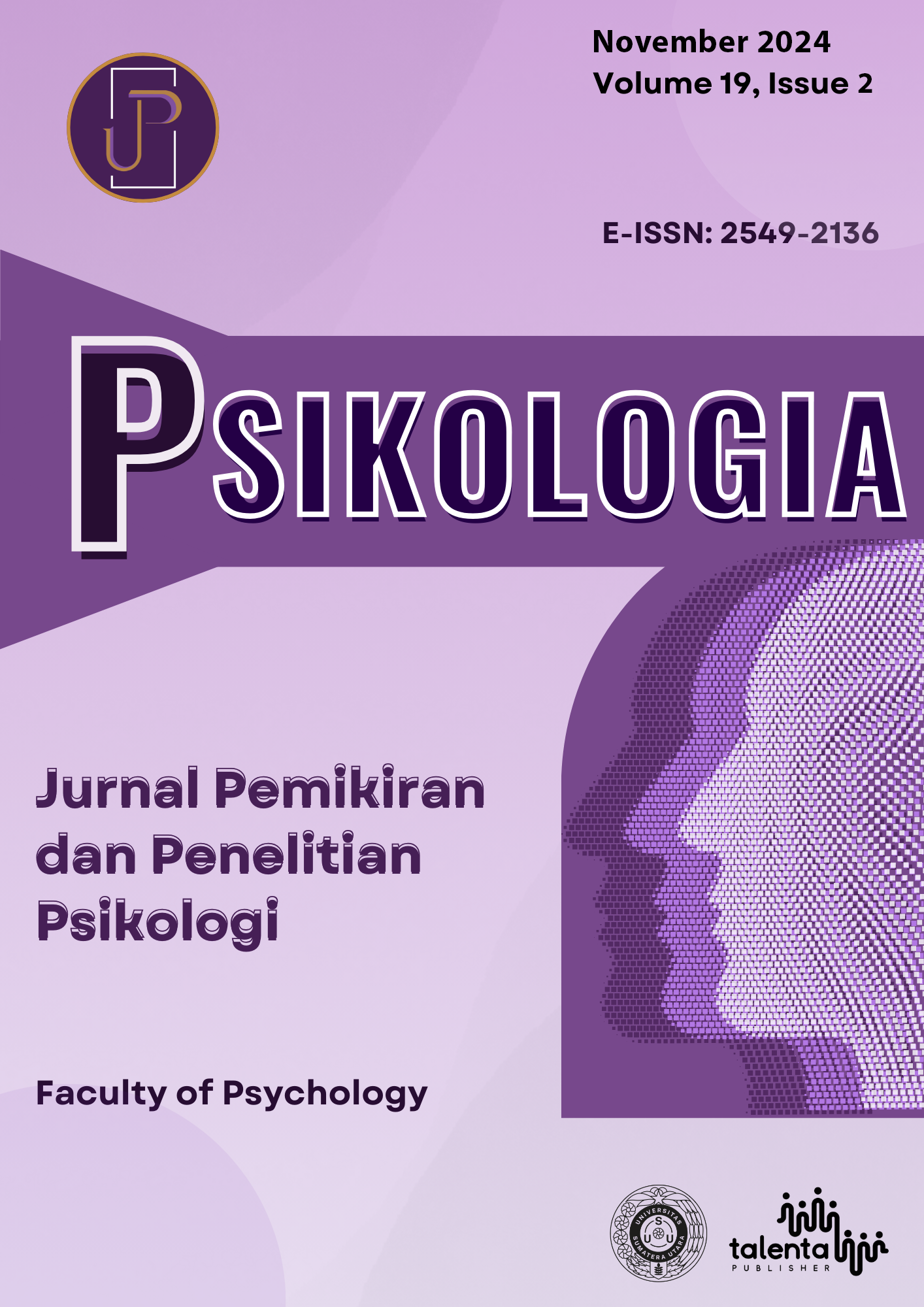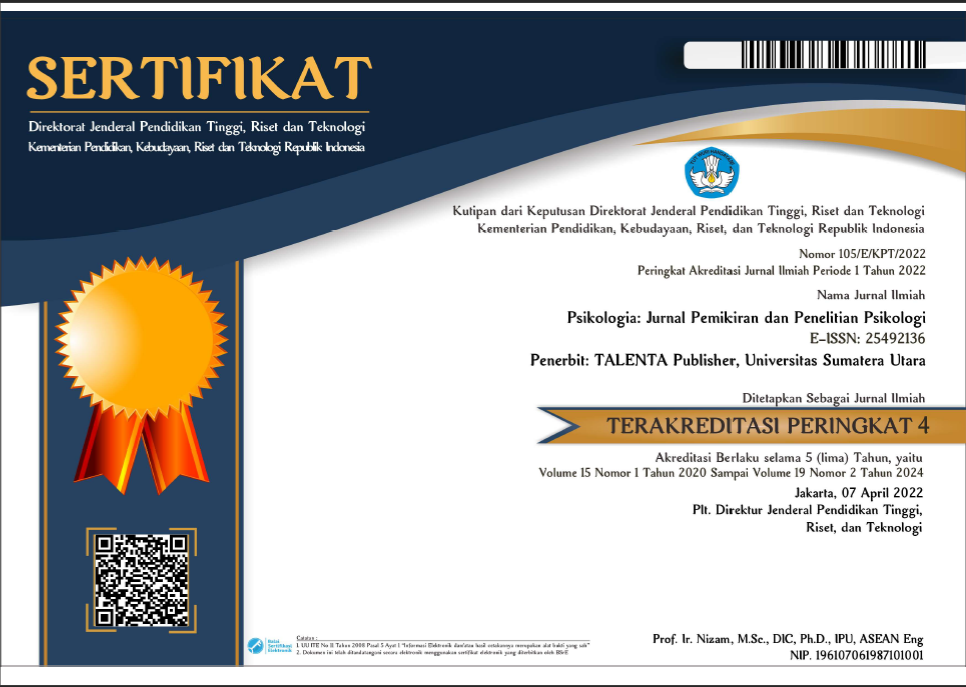The influence of emotional intelligence and peer social support on subjective well-being in early adolescents at SMP Istiqomah Sambas Boarding School Purbalingga
DOI:
https://doi.org/10.32734/psikologia.v19i2.17606Keywords:
emotional intelligence, peer social support, subjective well-beingAbstract
Adolescence is a period of development marked by upheaval and conflict, which can explain the problems experienced by students at Islamic boarding schools. This is related to students' comfort while living in Islamic boarding schools, which can reduce the level of subjective well-being of teenagers. This research examined the influence of emotional intelligence and peer social support on subjective well-being in early adolescents at SMP Istiqomah Samabas Boarding school Purbalingga. This research uses a quantitative approach with multiple linear regression analysis methods. This research used a saturated sampling technique in which the entire population was sampled, a total of 118 students, with 60 male students and 58 female students. The measuring instruments used are the subjective well-being scale (SwLS and SPANE), the emotional intelligence scale (EII), and the peer social support scale (SSSS). This research shows a significant influence between emotional intelligence and peer social support on subjective well-being, with a value of F=18.158, P=0.000, and R Square of 0.240, meaning that emotional intelligence and peer social support contribute 24% to subjective well-being. It is essential to carry out positive activities to develop emotional intelligence and team activities to foster a sense of friendship to increase high subjective well-being.
Downloads
References
A. B. Johnson and M. C. Adams. (2023). Exploring the impact of emotional intelligence on social integration and well-being in residential schools. Journal of Child and Family Studies.
Astuti, M., Akbar, R., & Karoma. (2023). Historis boarding school serta faktor – faktor yang mempengaruhinya. Jurnal Ilmiah Wahana Pendidikan, 9(12), 412–427.
Azwar, S. (2021). Penyusunan Skala Psikologi.
Bar-On, R. (2012). The impact of emotional intelligence on health and wellbeing. Emotional Intelligence - New Perspectives and Applications, June. https://doi.org/10.5772/32468
Cohen, S., Underwood, L. G., & Gottlieb, B. H. (2000). Social Support Measurement and Intervention: A Guide for Health and Social Scientists. https://books.google.fm/books?id=-h0SDAAAQBAJ&lpg=PP1&pg=PP1#v=onepage&q&f=false
Diener, E. (2000). Subjective well-being: The science of happiness and a proposal for a national index. American Psychologist, 55(1), 34–43. https://doi.org/10.1037/0003-066X.55.1.34
Diener, E. (2009). The Science of Well-Being.
Faizah, A., & Widyastuti. (2021). Relationship Between Peer Social Support and Subjective Well-Being in Students Living in Islamic Boarding Schools [ Hubungan Antara Dukungan Sosial Teman Sebaya dengan Subjective Well-Being pada Santri Ya ng Tinggal di Pondok Pesantren ]. 1–7.
Hall, G. S. (2004). Adolescence its psychology and its relations to physiology, anthropology, sociology sex, crime, religion and education, Vol. II. Adolescence Its Psychology and Its Relations to Physiology, Anthropology, Sociology Sex, Crime, Religion and Education, Vol. II. https://doi.org/10.1037/10618-000
Hamdana, F., & Alhamdu, A. (2016). Subjective well-being siswa MAN 3 Palembang yang tinggal di asrama. Psikis : Jurnal Psikologi Islami, 1(1), 95–104. https://doi.org/10.19109/psikis.v1i1.560
Here, S. V., & Priyanto, P. H. (2014). Subjective well-being pada remaja ditinjau dari kesadaran lingkungan. Psikodimensia, 13(1), 10–21.
Hidalgo-Fuentes, S., MartÃnez-Ãlvarez, I., Sospedra-Baeza, M. J., MartÃ-Vilar, M., Merino-Soto, C., & Toledano-Toledano, F. (2024). Emotional intelligence and perceived social support: its relationship with subjective well-being. Healthcare (Switzerland), 12(6). https://doi.org/10.3390/healthcare12060634
Hidayati, L., Amanda, R., Samara, S., Agustin, Y., & Sukatin. (2023). Pengaruh dukungan sosial terhadap kesejahteraan subjektif pada siswa (definisi kesejahteraan subjektif). Jurnal Pendidikan Dan Ilmu Sosial, 1(3), 177–185. https://doi.org/10.54066/jupendis-itb.v1i3
Hurlock, E. B. (1990). Psikologi perkembangan: suatu pendekatan sepanjang rentang kehidupan. Erlangga, Jakarta. https://books.google.co.id/books/about/Psikologi_perkembangan.html?id=UdpcAQAACAAJ&redir_esc=y
Ikromi, Z. A., Diponegoro, A. M., & Tentama, F. (2019). Faktor psikologis yang mempengaruhi subjective well-being pada remaja yang tinggal di pondok pesantren. Prosiding Seminar Nasional Magister Psikologi Universitas Ahmad Dahlan, 412–420.
Khamida, K., Arfianto, M. A., & ... (2019). Correlation of emotional intelligence with subjective well-being at students in Islamic boarding school. Proceeding …, December 2016, 6–9. https://conferences.unusa.ac.id/index.php/SIHC19/article/download/533/245
Mariyati, L. I., Partontari, R. A., & Kusuma, M. K. I. (2023). Peranan regulasi emosi terhadap subjective well being pada santri di Sidoarjo. Journal of Islamic and Contemporary Psychology (JICOP), 3(1s), 100–110. https://doi.org/10.25299/jicop.v3i1s.12349
Meita, A., Nurhadi, & Budiati, A. C. (2016). Rasionalitas Pilihan Orang Tua Terhadap Pesantren Sebagai Lembaga Pendidikan Remaja Awal. Pendidikan Sosiologi Antropologi, Fakultas Keguruan Dan Ilmu Pendidikan, Universitas Sebelas Maret, Surakarta.
Nindya, A. R., & Muhid, A. (2022). Pentingnya social support untuk meningkatkan subjective well-being santri pondok pesantren: A systematic literature review. Tarbawy: Jurnal Pendidikan Islam, 9(1), 51–62. https://jurnal.lp2msasbabel.ac.id/index.php/tar/article/view/2405%0Ahttps://jurnal.lp2msasbabel.ac.id/index.php/tar/article/download/2405/1025
Noor, M., Atieka, N., & Yunisa, L. (2020). Counseling Milenial ( Cm ). 1(December), 9–23.
Nurmalitasari, A., & Widyana, R. (2021). Hubungan antara harga diri dan dukungan sosial dengan kesejahteraan subjektif pada siswa MTS yang tinggal di pondok pesantren. Duconomics Sci-Meet (Education & Economics Science Meet), 1, 206–232. https://doi.org/10.37010/duconomics.v1.5443
Putri, D. R. (2016). Peran dukungan sosial dan kecerdasan emosi terhadap kesejahteraan subjektif pada remaja awal. Jurnal Indigenous, 1(1), 12–22.
R. W. Johnson and P. L. Martinez. (2024). Emotional Intelligence and Mental Health in Boarding School Settings: An Empirical Study". Mental Health and Education.
Rahmatullah, A. S., & Purnomo, H. (2020). Kenakalan remaja kaum santri di pesantren ‎(telaah deskriptif-fenomenologis) ‎. Ta’allum: Jurnal Pendidikan Islam, 8(2), 222–245. https://doi.org/10.21274/taalum.2020.8.2.222-245
Raihana, S. H. (2017). Kecerdasan emosional dalam Al-Qur’an. SCHEMA: Journal of Psychology Research, 3(1), 35–45. https://doi.org/10.29313/schema.v0i0.1807
Ryff, C. D., & Singer, B. (2001). Emotion, Social Relationships, and Health Get access to Arrow.
Salovey, P., & Mayer, J. D. (1990). Emotional intelligence. Educational Leadership, 58(3), 14–18. https://doi.org/10.2190/dugg-p24e-52wk-6cdg
Sarafino, E. P. (2008). Health Psychology Biopsychosocial Interactions.
Sardi, L. N., & Ayriza, Y. (2020). Pengaruh dukungan sosial teman sebaya terhadap subjective well-being pada remaja yang tinggal di pondok pesantren. Acta Psychologia, 2, 41–48.
Septilinda, A. 2017. (2017). “manajemen boarding school dan relevansinya dengan tujuan pendidikan Islam di Muhammadiyah Boarding School (MBS) Yogyakarta.†Pendidikan Madrasah, 2, 2:327.
Sugiyono. (2011). Metode Penelitian Kuantitatif, Kualitatif dan R&D.
Wilkinson, R. B. (2008). Development and properties of the adolescent friendship attachment scale. Journal of Youth and Adolescence, 37(10), 1270–1279. https://doi.org/10.1007/s10964-006-9141-7
Downloads
Published
How to Cite
Issue
Section
License
Copyright (c) 2024 Sri Muspitasari, Nia Anggri Noveni, Suwarti, & Gisella Arnis Grafiyana

This work is licensed under a Creative Commons Attribution-ShareAlike 4.0 International License.









